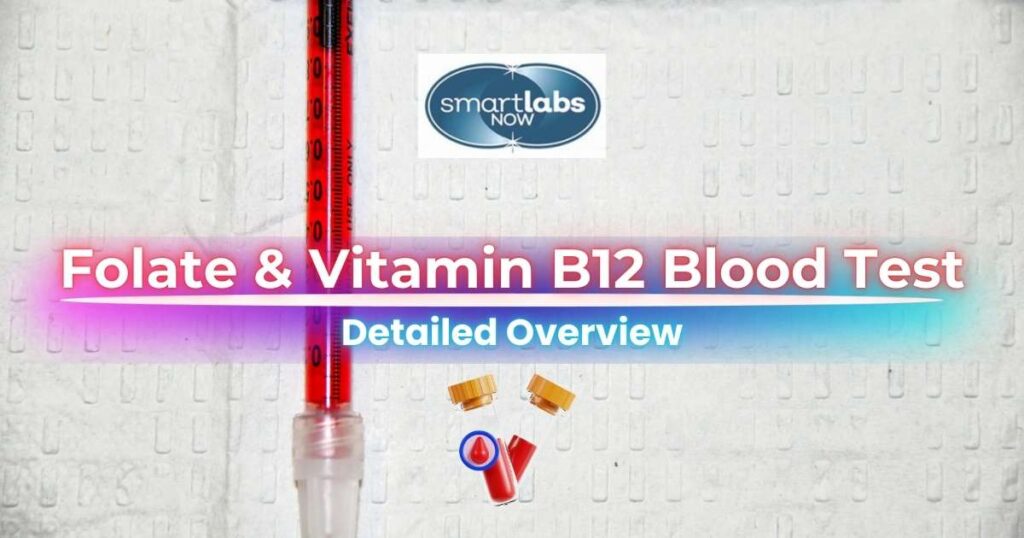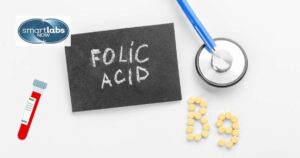
Maintaining optimal levels of folate and Vitamin B12 is crucial for various bodily functions, including the production of red blood cells, DNA synthesis, and proper neurological function. Blood tests for folate and Vitamin B12 help diagnose deficiencies and monitor related health conditions.
This guide provides a comprehensive overview to empower prospective test-takers with all the information they need.

The folate blood test evaluates the levels of folic acid (vitamin B9) in the blood, an essential nutrient for the formation of red blood cells and DNA synthesis. Testing is often recommended to diagnose deficiencies or monitor conditions such as anemia, malnutrition, and malabsorption.
Folate deficiencies can lead to megaloblastic anemia, a condition where red blood cells are larger than normal and fail to function effectively.
Folic acid also plays a critical role in preventing neural tube defects and other birth defects, making testing crucial for pregnant women or those planning pregnancy. Individuals with cobalamin (Vitamin B12) deficiencies, neuropathy, or conditions like Crohn’s disease and celiac disease, which impair nutrient absorption, might also require this test.
Testing folate levels helps evaluate overall nutritional status and can uncover underlying causes of malnutrition or chronic health issues affecting red blood cells. Folate levels are measured using serum or plasma samples, which provide insight into immediate or longer-term folate levels, respectively.
Proper preparation ensures accurate test results. Patients are often advised to fast for several hours before the test, as recent food intake can affect folate measurements.
The folate blood test is a simple procedure involving the collection of a small blood sample. A healthcare professional cleans the skin, inserts a needle, and draws blood into a tube. The sample is then sent to a laboratory to measure the folate concentration in the serum or red blood cells.
This test may also be performed alongside measurements of homocysteine levels to assess folate metabolism. Elevated homocysteine can indicate inadequate folate, affecting health outcomes such as birth defect prevention and cardiovascular health.
Folate test results typically fall into one of three categories: normal, low, or high.
Abnormal results may warrant further tests or interventions, including dietary changes or folic acid therapy.
Numerous factors can influence the outcomes of a folate blood test:
Folate blood tests may be referred to by various names, such as:
These alternative names highlight different facets of folate’s biological importance, such as its role in glutamate residues and one-carbon group metabolism.
Though generally safe, a folate blood test carries minor risks, such as bruising or infection at the puncture site. Blood draws may be slightly more complicated for individuals with specific health conditions, such as megaloblastic anemia, kidney failure, or nerve damage.
Folate levels also correlate with long-term health risks, including brain or spine defects in newborns if deficiencies are left untreated.
To gain a comprehensive picture of health, folate tests are often paired with:

Vitamin B12 is essential for red blood cell production, nerve health, and tissue repair. A Vitamin B12 blood test helps diagnose deficiencies that may result in megaloblastic anemia or pernicious anemia, a condition caused by the lack of Intrinsic Factor (IP), which is crucial for Vitamin B12 absorption.
Other indications include assessing symptoms of neuropathy, digestive issues, or conditions like liver disease, which can alter B12 levels.
Testing is especially critical for those on vegan or vegetarian diets, as plant-based foods lack natural B12.
Vitamin B12 tests are performed similarly to folate tests, requiring a blood draw. In certain cases, urine tests may also be used to assess methylmalonic acid (MMA) levels, which indicate B12 deficiency.
To prepare for the test:
Normal values range from 160 to 950 picograms per milliliter (pg/mL) or 118 to 701 picomoles per liter (pmol/L). Low levels – below 200 pg/mL – may indicate conditions such as pernicious anemia, absorption issues, or dietary deficiencies.
While less common, high levels could suggest liver dysfunction, leukemia, or excessive supplementation.
Early detection of abnormal levels allows for timely intervention, including dietary changes or supplements.
To maintain adequate levels, include foods like:
The recommended daily allowance (RDA) for adults is 2.4 micrograms, which increases during pregnancy and lactation.
Deficiency in Vitamin B12 can manifest in several ways, including:
Treatment depends on the cause and severity of deficiency:
Vitamin B12 therapy is tailored to individual needs for effective results.
Vitamin B12 blood tests are minimally invasive procedures with very few risks. However, understanding what to expect during and after the test can help alleviate any concerns.
During the procedure, a healthcare professional inserts a sterile needle into a vein, typically in the arm, to draw blood. While most people experience only a mild pinch or pressure, others may notice slight bruising, soreness, or tenderness at the puncture site.
Risks may be heightened for individuals with underlying health conditions. For example, individuals who have undergone gastric bypass surgery often require regular Vitamin B12 testing, as this procedure can significantly impair nutrient absorption, leading to long-term deficiencies. Left untreated, such deficiencies may result in neurological symptoms, including numbness, tingling, and loss of balance.
Over time, these issues could escalate into movement problems or even permanent nervous system damage.
Vitamin B12 deficiency can also manifest as weakness, a sore mouth or tongue, and delayed development in children.
Although rare, prolonged deficiency may increase the risk of brain damage due to compromised nerve function. Early detection and treatment are critical for preventing severe complications. If you feel lightheaded or anxious during blood draws, informing the technician can help ensure your comfort and safety throughout the process.
Vitamin B12 testing often raises important questions, particularly for those at risk of deficiency or related health conditions. Below, we address some common concerns:
A variety of factors can contribute to Vitamin B12 deficiency. Pernicious anemia, an autoimmune condition, prevents the body from absorbing B12 due to a lack of Intrinsic Factor (IF) in the stomach. Celiac disease and other gastrointestinal conditions also impede nutrient absorption. For vegans and vegetarians, dietary limitations can lead to insufficient B12 intake, as it is predominantly found in animal-based foods.
High levels are less common and typically stem from underlying medical conditions, such as liver disease, leukemia, or systemic lupus erythematosus (SLE). While excessive dietary intake is rare, abnormally high Vitamin B12 levels warrant further investigation to identify any associated disorders.
Older adults face an increased risk due to diminished stomach acid production, which is necessary for B12 absorption. Additionally, individuals who have had gastric bypass surgery are prone to deficiencies because the altered digestive system interferes with nutrient uptake.
Vitamin B12 plays a vital role in regulating homocysteine levels. Elevated homocysteine is a marker for cardiovascular risk and may also indicate B12 deficiency. Testing for both can provide a more comprehensive picture of health.
Common symptoms include fatigue, anemia, neurological issues like numbness and tingling, and difficulty concentrating. Long-term deficiencies may result in severe complications, such as nerve damage or cognitive decline.
For those concerned about deficiency risks, especially vegans, vegetarians, and individuals with autoimmune or digestive disorders, regular Vitamin B12 testing is a proactive step toward maintaining optimal health.

If you’re in Portland, schedule testing with us for a quick, affordable, and gentle blood draw experience. All our tests, including our Vitamin Deficiency (Folate & B12 Levels) panel, are tuned for highly accurate results.
Please consult your primary care physician before engaging with any pharmaceutical, natural substances, or activity regimens mentioned or prescribed in this post. Smart Labs Now is not responsible for health or life outcomes based on the information or recommendations provided. This account does not serve as a substitute for professional medical advice/help.